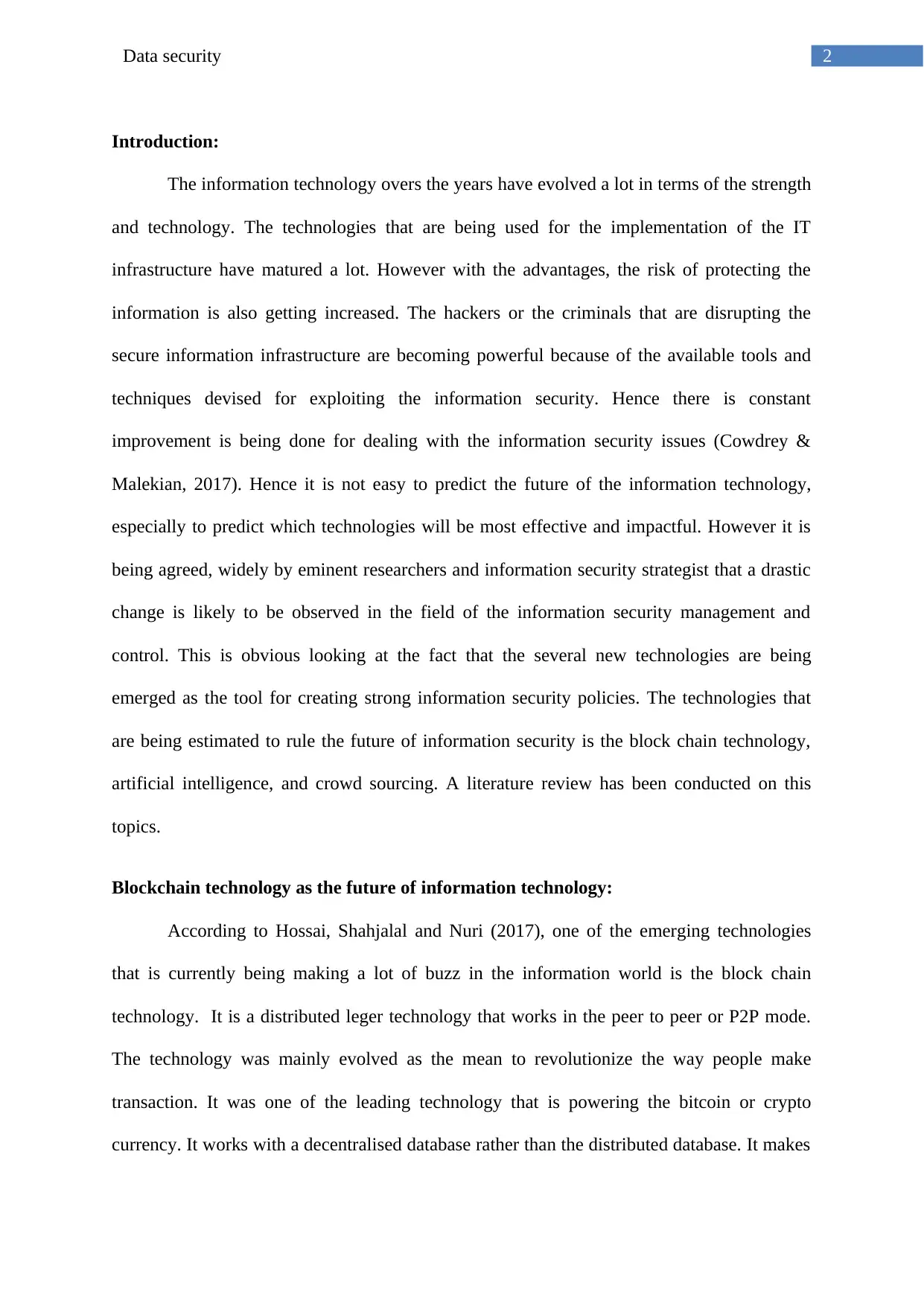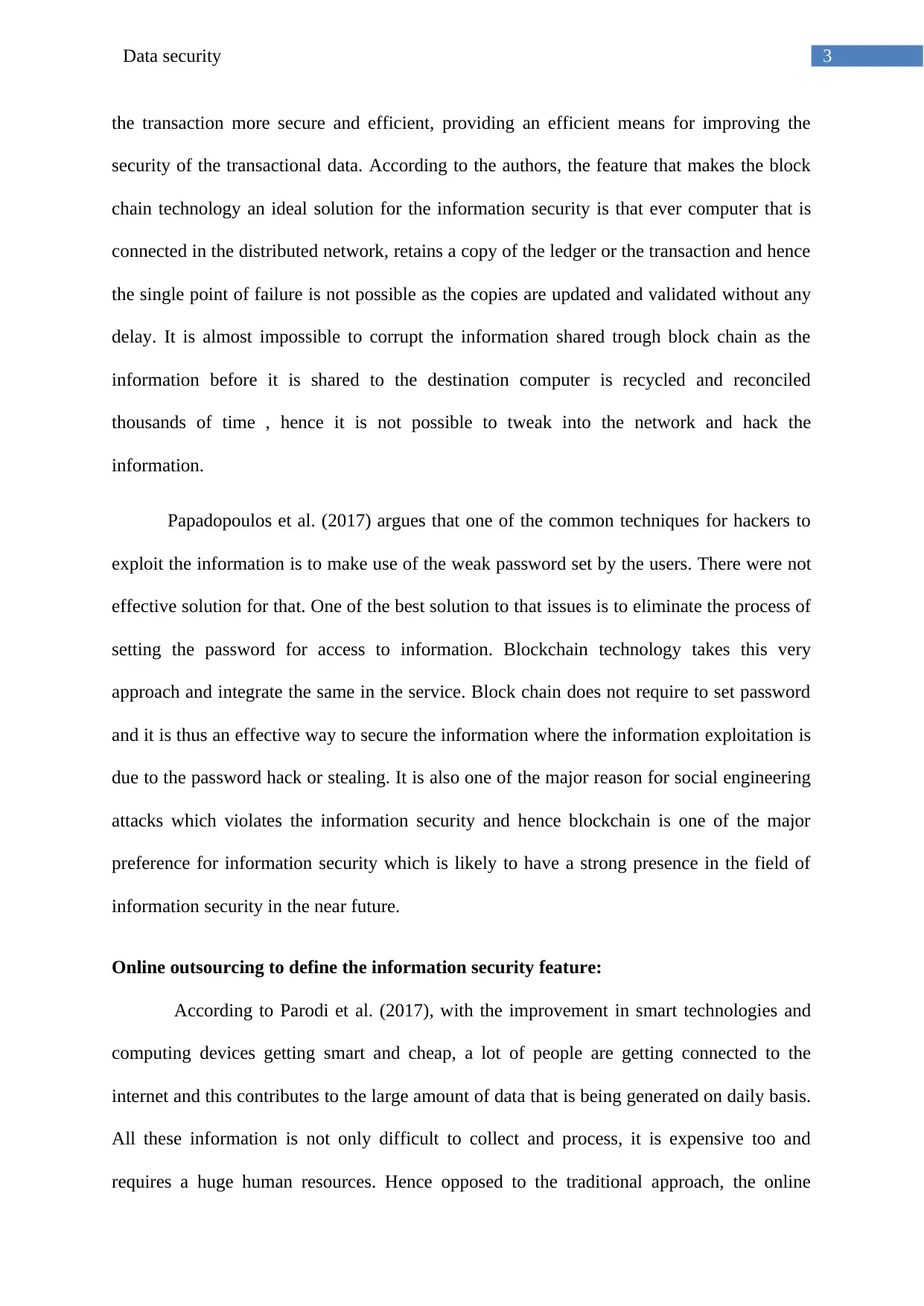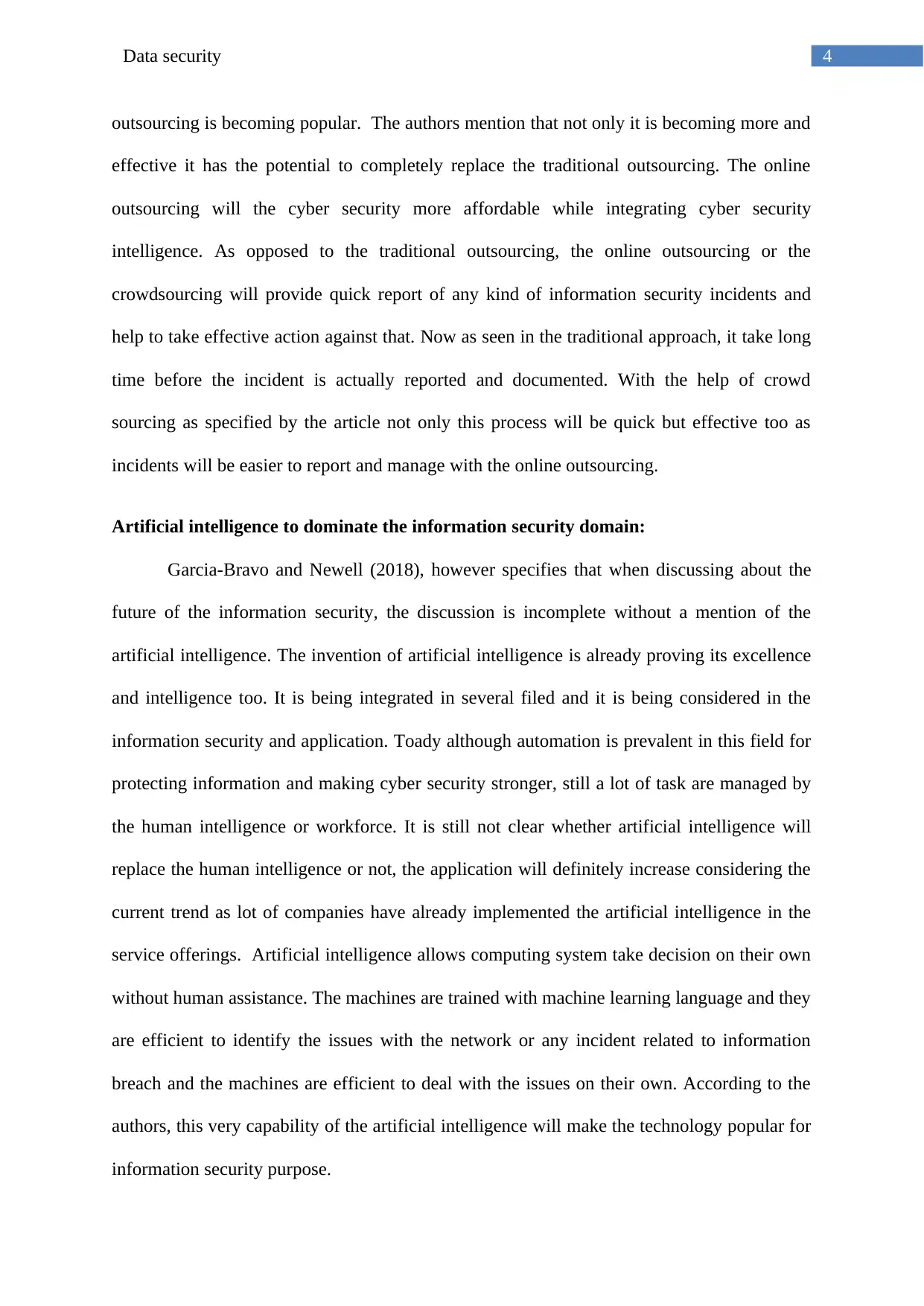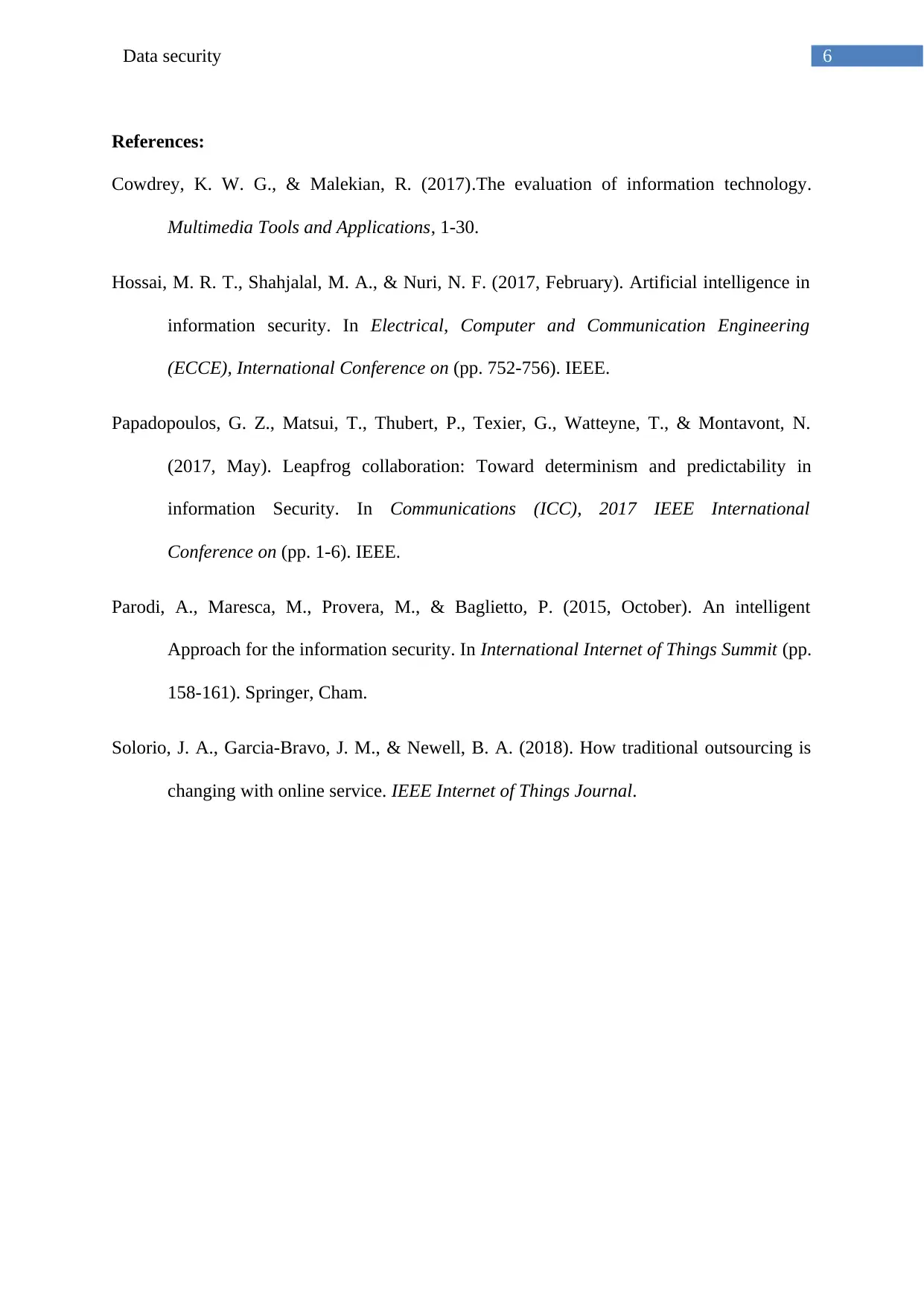Emerging Technologies in Information Security: Blockchain, AI, and Crowdsourcing
VerifiedAdded on 2023/06/07
|7
|1366
|408
AI Summary
This article discusses the emerging technologies that are likely to dominate the field of information security in the near future. It explores the potential of blockchain technology, artificial intelligence, and crowdsourcing to improve data security and protect against cyber threats. The article also highlights the benefits of online outsourcing and the role of human intelligence in information security.
Contribute Materials
Your contribution can guide someone’s learning journey. Share your
documents today.

Running head: Data security
Data security
Name of the Student
Name of the University
Author’s note
Data security
Name of the Student
Name of the University
Author’s note
Secure Best Marks with AI Grader
Need help grading? Try our AI Grader for instant feedback on your assignments.

1Data security
Table of Contents
Introduction:...............................................................................................................................2
Blockchain technology as the future information technology:..................................................2
Online outsourcing to define the information security feature:.................................................3
Artificial intelligence to dominate the information security domain:........................................4
References:.................................................................................................................................5
Table of Contents
Introduction:...............................................................................................................................2
Blockchain technology as the future information technology:..................................................2
Online outsourcing to define the information security feature:.................................................3
Artificial intelligence to dominate the information security domain:........................................4
References:.................................................................................................................................5

2Data security
Introduction:
The information technology overs the years have evolved a lot in terms of the strength
and technology. The technologies that are being used for the implementation of the IT
infrastructure have matured a lot. However with the advantages, the risk of protecting the
information is also getting increased. The hackers or the criminals that are disrupting the
secure information infrastructure are becoming powerful because of the available tools and
techniques devised for exploiting the information security. Hence there is constant
improvement is being done for dealing with the information security issues (Cowdrey &
Malekian, 2017). Hence it is not easy to predict the future of the information technology,
especially to predict which technologies will be most effective and impactful. However it is
being agreed, widely by eminent researchers and information security strategist that a drastic
change is likely to be observed in the field of the information security management and
control. This is obvious looking at the fact that the several new technologies are being
emerged as the tool for creating strong information security policies. The technologies that
are being estimated to rule the future of information security is the block chain technology,
artificial intelligence, and crowd sourcing. A literature review has been conducted on this
topics.
Blockchain technology as the future of information technology:
According to Hossai, Shahjalal and Nuri (2017), one of the emerging technologies
that is currently being making a lot of buzz in the information world is the block chain
technology. It is a distributed leger technology that works in the peer to peer or P2P mode.
The technology was mainly evolved as the mean to revolutionize the way people make
transaction. It was one of the leading technology that is powering the bitcoin or crypto
currency. It works with a decentralised database rather than the distributed database. It makes
Introduction:
The information technology overs the years have evolved a lot in terms of the strength
and technology. The technologies that are being used for the implementation of the IT
infrastructure have matured a lot. However with the advantages, the risk of protecting the
information is also getting increased. The hackers or the criminals that are disrupting the
secure information infrastructure are becoming powerful because of the available tools and
techniques devised for exploiting the information security. Hence there is constant
improvement is being done for dealing with the information security issues (Cowdrey &
Malekian, 2017). Hence it is not easy to predict the future of the information technology,
especially to predict which technologies will be most effective and impactful. However it is
being agreed, widely by eminent researchers and information security strategist that a drastic
change is likely to be observed in the field of the information security management and
control. This is obvious looking at the fact that the several new technologies are being
emerged as the tool for creating strong information security policies. The technologies that
are being estimated to rule the future of information security is the block chain technology,
artificial intelligence, and crowd sourcing. A literature review has been conducted on this
topics.
Blockchain technology as the future of information technology:
According to Hossai, Shahjalal and Nuri (2017), one of the emerging technologies
that is currently being making a lot of buzz in the information world is the block chain
technology. It is a distributed leger technology that works in the peer to peer or P2P mode.
The technology was mainly evolved as the mean to revolutionize the way people make
transaction. It was one of the leading technology that is powering the bitcoin or crypto
currency. It works with a decentralised database rather than the distributed database. It makes

3Data security
the transaction more secure and efficient, providing an efficient means for improving the
security of the transactional data. According to the authors, the feature that makes the block
chain technology an ideal solution for the information security is that ever computer that is
connected in the distributed network, retains a copy of the ledger or the transaction and hence
the single point of failure is not possible as the copies are updated and validated without any
delay. It is almost impossible to corrupt the information shared trough block chain as the
information before it is shared to the destination computer is recycled and reconciled
thousands of time , hence it is not possible to tweak into the network and hack the
information.
Papadopoulos et al. (2017) argues that one of the common techniques for hackers to
exploit the information is to make use of the weak password set by the users. There were not
effective solution for that. One of the best solution to that issues is to eliminate the process of
setting the password for access to information. Blockchain technology takes this very
approach and integrate the same in the service. Block chain does not require to set password
and it is thus an effective way to secure the information where the information exploitation is
due to the password hack or stealing. It is also one of the major reason for social engineering
attacks which violates the information security and hence blockchain is one of the major
preference for information security which is likely to have a strong presence in the field of
information security in the near future.
Online outsourcing to define the information security feature:
According to Parodi et al. (2017), with the improvement in smart technologies and
computing devices getting smart and cheap, a lot of people are getting connected to the
internet and this contributes to the large amount of data that is being generated on daily basis.
All these information is not only difficult to collect and process, it is expensive too and
requires a huge human resources. Hence opposed to the traditional approach, the online
the transaction more secure and efficient, providing an efficient means for improving the
security of the transactional data. According to the authors, the feature that makes the block
chain technology an ideal solution for the information security is that ever computer that is
connected in the distributed network, retains a copy of the ledger or the transaction and hence
the single point of failure is not possible as the copies are updated and validated without any
delay. It is almost impossible to corrupt the information shared trough block chain as the
information before it is shared to the destination computer is recycled and reconciled
thousands of time , hence it is not possible to tweak into the network and hack the
information.
Papadopoulos et al. (2017) argues that one of the common techniques for hackers to
exploit the information is to make use of the weak password set by the users. There were not
effective solution for that. One of the best solution to that issues is to eliminate the process of
setting the password for access to information. Blockchain technology takes this very
approach and integrate the same in the service. Block chain does not require to set password
and it is thus an effective way to secure the information where the information exploitation is
due to the password hack or stealing. It is also one of the major reason for social engineering
attacks which violates the information security and hence blockchain is one of the major
preference for information security which is likely to have a strong presence in the field of
information security in the near future.
Online outsourcing to define the information security feature:
According to Parodi et al. (2017), with the improvement in smart technologies and
computing devices getting smart and cheap, a lot of people are getting connected to the
internet and this contributes to the large amount of data that is being generated on daily basis.
All these information is not only difficult to collect and process, it is expensive too and
requires a huge human resources. Hence opposed to the traditional approach, the online
Secure Best Marks with AI Grader
Need help grading? Try our AI Grader for instant feedback on your assignments.

4Data security
outsourcing is becoming popular. The authors mention that not only it is becoming more and
effective it has the potential to completely replace the traditional outsourcing. The online
outsourcing will the cyber security more affordable while integrating cyber security
intelligence. As opposed to the traditional outsourcing, the online outsourcing or the
crowdsourcing will provide quick report of any kind of information security incidents and
help to take effective action against that. Now as seen in the traditional approach, it take long
time before the incident is actually reported and documented. With the help of crowd
sourcing as specified by the article not only this process will be quick but effective too as
incidents will be easier to report and manage with the online outsourcing.
Artificial intelligence to dominate the information security domain:
Garcia-Bravo and Newell (2018), however specifies that when discussing about the
future of the information security, the discussion is incomplete without a mention of the
artificial intelligence. The invention of artificial intelligence is already proving its excellence
and intelligence too. It is being integrated in several filed and it is being considered in the
information security and application. Toady although automation is prevalent in this field for
protecting information and making cyber security stronger, still a lot of task are managed by
the human intelligence or workforce. It is still not clear whether artificial intelligence will
replace the human intelligence or not, the application will definitely increase considering the
current trend as lot of companies have already implemented the artificial intelligence in the
service offerings. Artificial intelligence allows computing system take decision on their own
without human assistance. The machines are trained with machine learning language and they
are efficient to identify the issues with the network or any incident related to information
breach and the machines are efficient to deal with the issues on their own. According to the
authors, this very capability of the artificial intelligence will make the technology popular for
information security purpose.
outsourcing is becoming popular. The authors mention that not only it is becoming more and
effective it has the potential to completely replace the traditional outsourcing. The online
outsourcing will the cyber security more affordable while integrating cyber security
intelligence. As opposed to the traditional outsourcing, the online outsourcing or the
crowdsourcing will provide quick report of any kind of information security incidents and
help to take effective action against that. Now as seen in the traditional approach, it take long
time before the incident is actually reported and documented. With the help of crowd
sourcing as specified by the article not only this process will be quick but effective too as
incidents will be easier to report and manage with the online outsourcing.
Artificial intelligence to dominate the information security domain:
Garcia-Bravo and Newell (2018), however specifies that when discussing about the
future of the information security, the discussion is incomplete without a mention of the
artificial intelligence. The invention of artificial intelligence is already proving its excellence
and intelligence too. It is being integrated in several filed and it is being considered in the
information security and application. Toady although automation is prevalent in this field for
protecting information and making cyber security stronger, still a lot of task are managed by
the human intelligence or workforce. It is still not clear whether artificial intelligence will
replace the human intelligence or not, the application will definitely increase considering the
current trend as lot of companies have already implemented the artificial intelligence in the
service offerings. Artificial intelligence allows computing system take decision on their own
without human assistance. The machines are trained with machine learning language and they
are efficient to identify the issues with the network or any incident related to information
breach and the machines are efficient to deal with the issues on their own. According to the
authors, this very capability of the artificial intelligence will make the technology popular for
information security purpose.

5Data security

6Data security
References:
Cowdrey, K. W. G., & Malekian, R. (2017).The evaluation of information technology.
Multimedia Tools and Applications, 1-30.
Hossai, M. R. T., Shahjalal, M. A., & Nuri, N. F. (2017, February). Artificial intelligence in
information security. In Electrical, Computer and Communication Engineering
(ECCE), International Conference on (pp. 752-756). IEEE.
Papadopoulos, G. Z., Matsui, T., Thubert, P., Texier, G., Watteyne, T., & Montavont, N.
(2017, May). Leapfrog collaboration: Toward determinism and predictability in
information Security. In Communications (ICC), 2017 IEEE International
Conference on (pp. 1-6). IEEE.
Parodi, A., Maresca, M., Provera, M., & Baglietto, P. (2015, October). An intelligent
Approach for the information security. In International Internet of Things Summit (pp.
158-161). Springer, Cham.
Solorio, J. A., Garcia-Bravo, J. M., & Newell, B. A. (2018). How traditional outsourcing is
changing with online service. IEEE Internet of Things Journal.
References:
Cowdrey, K. W. G., & Malekian, R. (2017).The evaluation of information technology.
Multimedia Tools and Applications, 1-30.
Hossai, M. R. T., Shahjalal, M. A., & Nuri, N. F. (2017, February). Artificial intelligence in
information security. In Electrical, Computer and Communication Engineering
(ECCE), International Conference on (pp. 752-756). IEEE.
Papadopoulos, G. Z., Matsui, T., Thubert, P., Texier, G., Watteyne, T., & Montavont, N.
(2017, May). Leapfrog collaboration: Toward determinism and predictability in
information Security. In Communications (ICC), 2017 IEEE International
Conference on (pp. 1-6). IEEE.
Parodi, A., Maresca, M., Provera, M., & Baglietto, P. (2015, October). An intelligent
Approach for the information security. In International Internet of Things Summit (pp.
158-161). Springer, Cham.
Solorio, J. A., Garcia-Bravo, J. M., & Newell, B. A. (2018). How traditional outsourcing is
changing with online service. IEEE Internet of Things Journal.
1 out of 7
Related Documents
Your All-in-One AI-Powered Toolkit for Academic Success.
+13062052269
info@desklib.com
Available 24*7 on WhatsApp / Email
![[object Object]](/_next/static/media/star-bottom.7253800d.svg)
Unlock your academic potential
© 2024 | Zucol Services PVT LTD | All rights reserved.



